Who’s running the war in Ukraine?
IRIA Staff - March 05, 2022

With Russia’s ongoing conquest of Ukraine, the Russian military and administration have become the center of attention. The mainstream media and leaders of the western world frequently point out Russian President Vladimir Putin. As the commander in chief of the Russian military, Putin is primarily responsible for the decision-making, however, Putin has always relied on his loyal group subordinates for the execution of his orders.
Putin’s close circle consists of many of his old-time colleagues and friends who started their careers in the Soviet era. Here are some of the closest cabinet members and administration officials of Putin’s regime who are working as the brains behind the Russian attack on Ukraine.
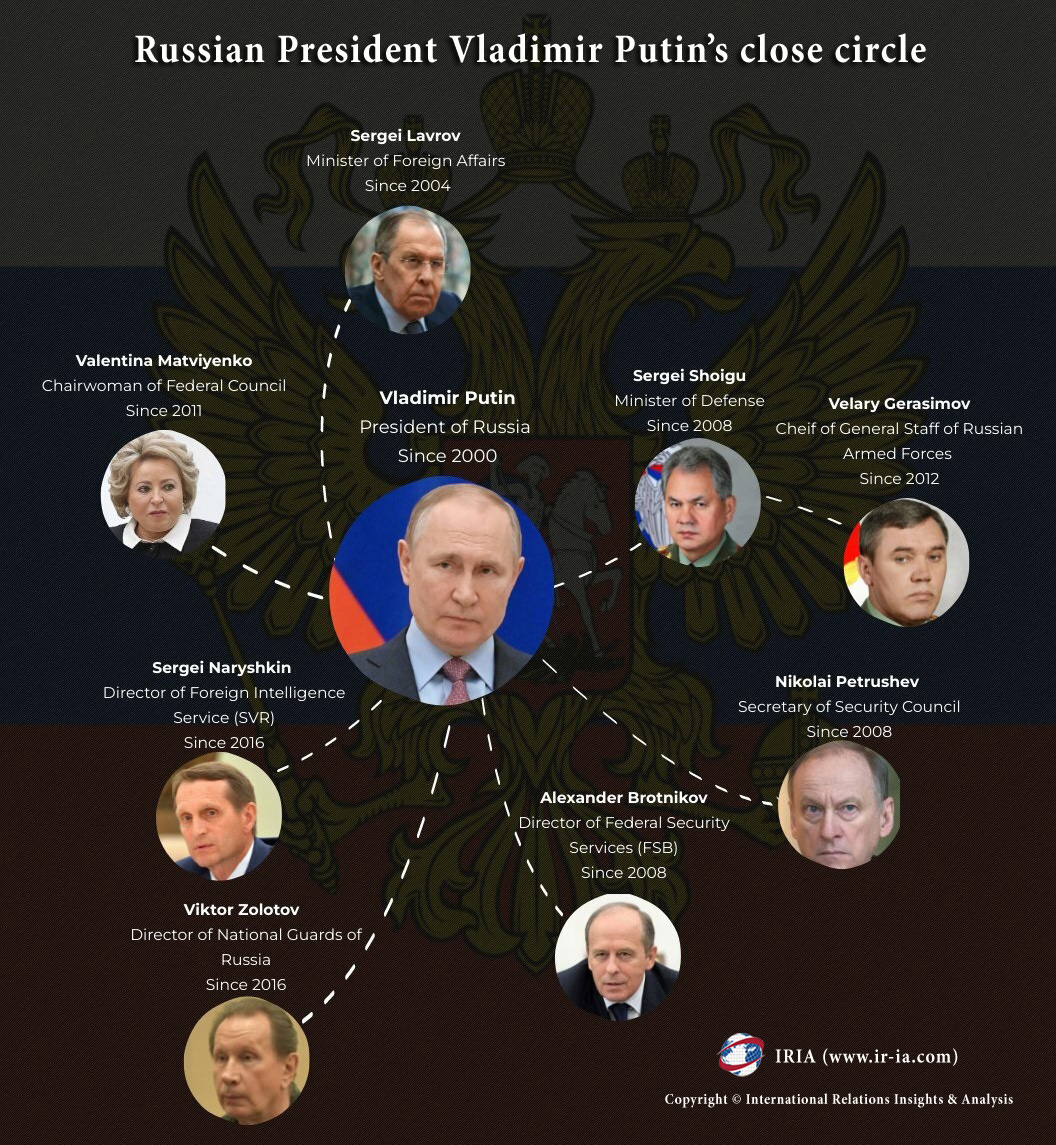
1. Sergey Shoigu
Sergey Shoigu is Russia’s Minister of Defense and Putin’s close friend. He was at one point considered to be Putin’s successor due to his close personal association with the Russian president. Due to his educational background in architecture and engineering, he started his career in the Soviet Union’s construction projects. After moving through the ranks of the Communist Party of the Soviet Union, Shoigu arrived in Moscow to be appointed as the Deputy Chief of State Architecture and Construction Committee of the Russian Federation. He was later appointed as the Governor of Moscow Oblast before assuming the responsibility of Defense Minister in 2012.
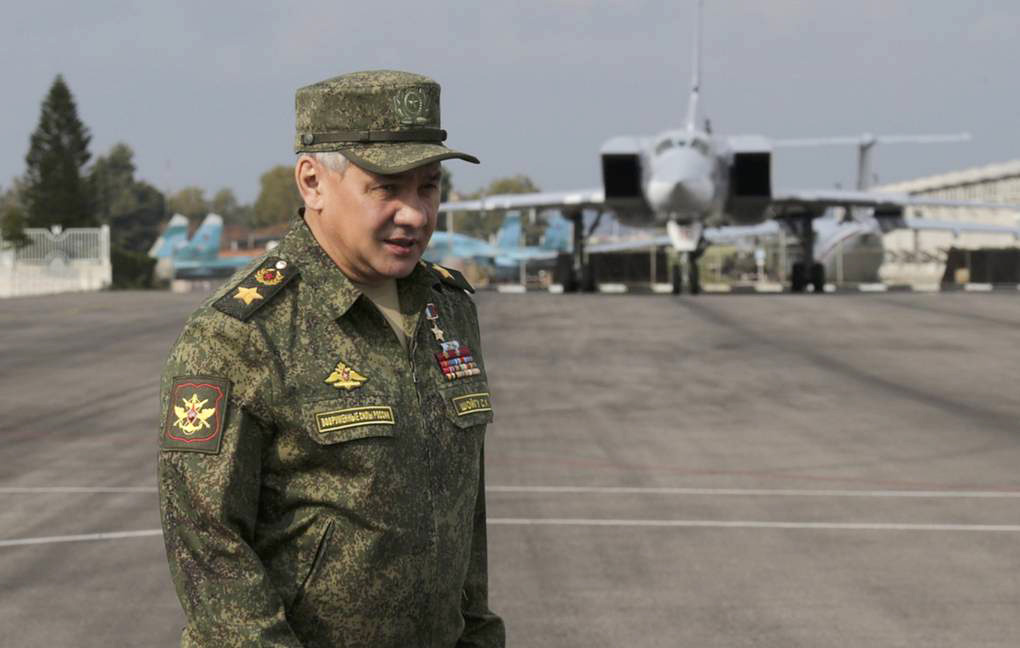 Russian Defense Minister Sergey Shoigu (Image Credit: Russian Defense Ministry Press Service/EPA-EFE)
Russian Defense Minister Sergey Shoigu (Image Credit: Russian Defense Ministry Press Service/EPA-EFE)
Shoigu is considered to be Putin’s go-to man for taking advice on matters related to national security and defense strategy. Apart from Russian, Shoigu speaks nine different languages including English, Chinese, Japanese, and Turkish. In the recent pictures released by the Kremlin, Shoigu can be seen sharing tables with the President which makes it evident that he is playing an important role in Russia’s military advancements in Ukraine.
2. Valery Gerasimov
After Commander in Chief Vladimir Putin and Defense Minister Sergey Shoigu, the Chief of General Staff of the Russian Armed Forces Valery Gerasimov is the third in command controlling the Russian military decision making. Hailing from Kazan, Gerasimov has played an important role in all the recent military campaigns carried out by the Russian army with his first task being the Commander of the army during the Chechen war in 1999. Gerasimov is in charge of executing the plans on the ground.
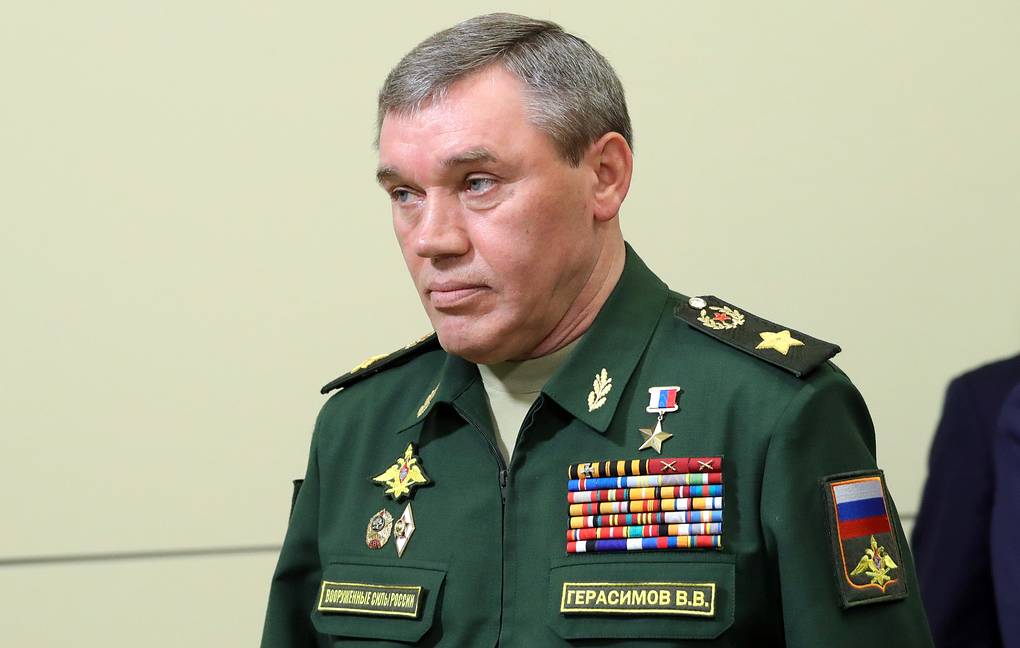 Chief of Russian General Staff and First Deputy Defense Minister Army General Valery Gerasimov. (Image Credit: Mikhail Klimentyev/Russian Presidential Press and Information Office/TASS)
Chief of Russian General Staff and First Deputy Defense Minister Army General Valery Gerasimov. (Image Credit: Mikhail Klimentyev/Russian Presidential Press and Information Office/TASS)
In December 2021, Gerasimov issued a warning to the Ukrainian government for violating the Minsk agreement. He stated “Kyiv is not fulfilling the Minsk Agreements. The Ukrainian armed forces are touting that they have started to employ U.S.-supplied Javelin, anti-tank missile systems in Donbas and they are also using Turkish strike drones. As a result, the already tense situation in the east of that country is further deteriorating.” His warning letter became the base behind Russia’s special military operation in Ukraine. Following the events of the Russian attack, Gerasimov was imposed with severe sanctions from both U.S. and European Union.
3. Nikolay Patrushev
Nikolay Patrushev is Putin’s Secretary of Security Council. Patrushev has been a Putin loyalist since he started his political career in his hometown of Saint Petersburg. Back then, the city was still known by its old name, Leningrad. Patrushev is not only a long-term associate of President Putin but also holds a similar career trajectory and persona as Putin.
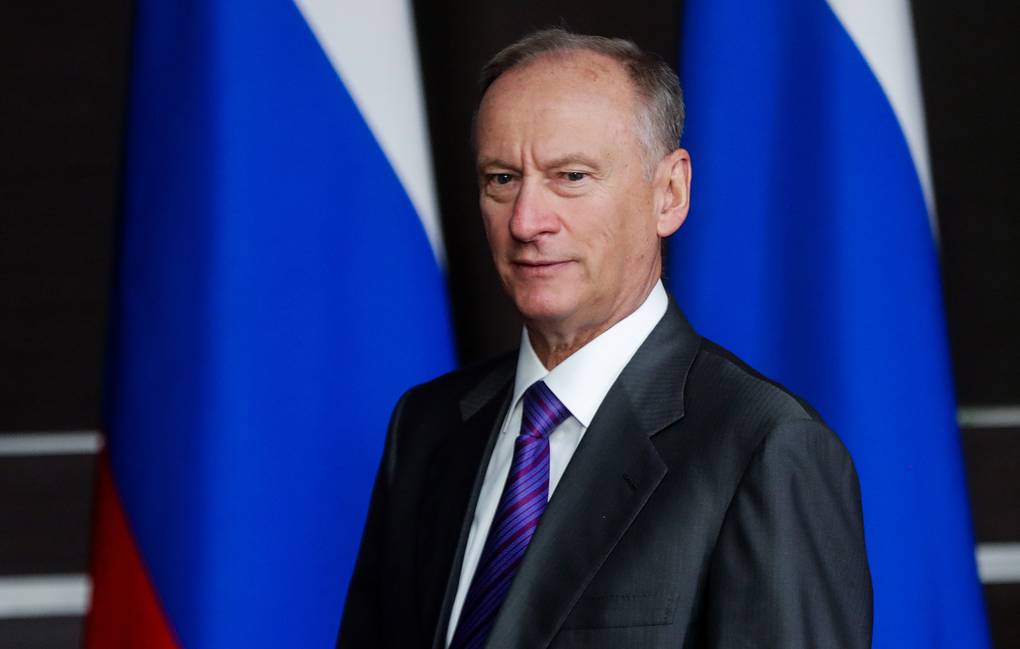 Secretary of the Russian Security Council Nikolay Patrushev. (Image Credit: Mikhail Metzel/TASS)
Secretary of the Russian Security Council Nikolay Patrushev. (Image Credit: Mikhail Metzel/TASS)
Owing to his educational background from the Leningrad Shipbuilding Institute, Patrushev started his career as an engineer in Soviet Navy. Soon after he was recruited by the KGB and started taking military intelligence and security-related training in Minsk. He holds a strong sentiment against the United States and the Western world which he brings up from time to time.
4. Alexander Bortnikov
Alexander Vasilyevich Bortnikov has been the Director of Federal Security Services (FSB) since 2008. FSB is considered to be the successor to Soviet Union’s KGB. Bortnikov was appointed as the Director of FSB after Patrushev was promoted from the rank.
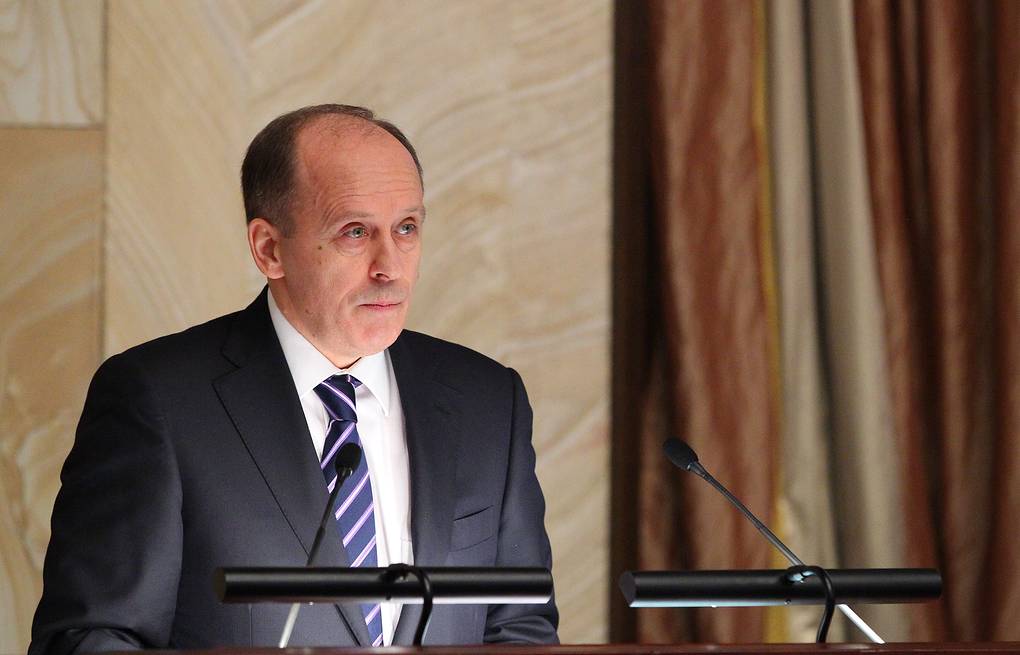 Director of Federal Security Services Alexander Vasilyevich Bortnikov. (Image Credit: Mikhail Klimentyev/ITAR-TASS))
Director of Federal Security Services Alexander Vasilyevich Bortnikov. (Image Credit: Mikhail Klimentyev/ITAR-TASS))
Bortnikov is also close to President Putin and shares a history with the president since his time in Saint Petersburg. Brotnikov is on the Board of Directors of Sovcomflot, which is Russia’s largest shipping company. Due to his affiliation with the large business, he is often alleged by the West to provide money laundering services for the Russian government.
5. Sergey Naryshkin
Sergey Naryshkin is the third Putin loyalist from his time in Saint Petersburg. Naryshkin is currently serving as Director of the Foreign Intelligence Services (SVR). Unlike Bortnikov and Patrushev, who have a decorated military background, Naryshkin started his career as a businessman and graduated from the International Management Institute of St. Petersburg with a degree in economics.
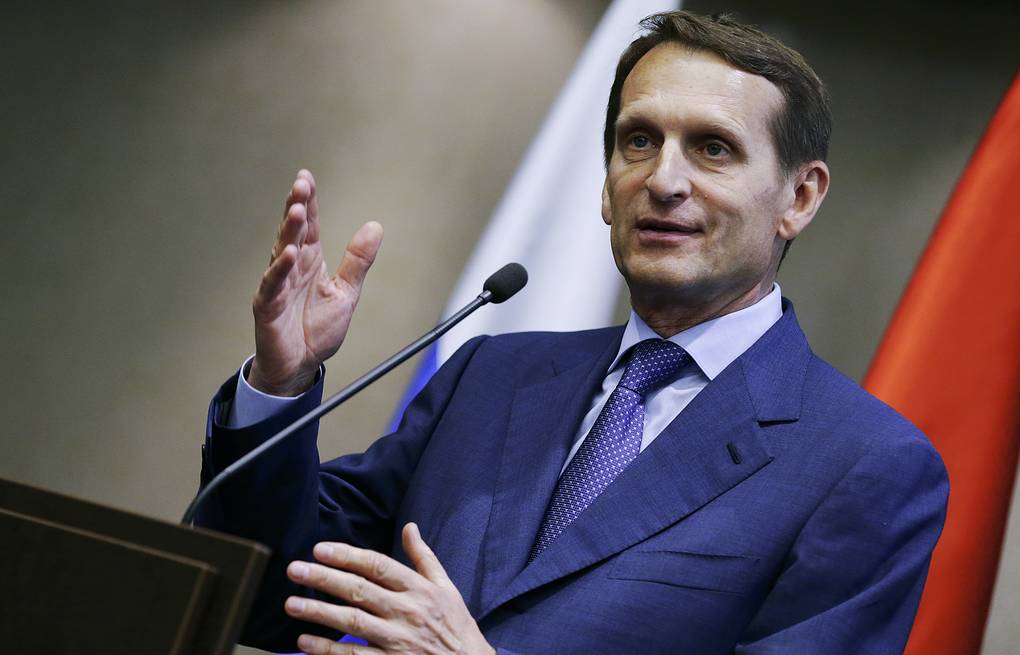 Russian Foreign Intelligence Service Director Sergey Naryshkin. (Image Credit: Anna Isakova/Russian State Duma Press Office/TASS)
Russian Foreign Intelligence Service Director Sergey Naryshkin. (Image Credit: Anna Isakova/Russian State Duma Press Office/TASS)
After his graduation in 1990, he started working for the Soviet Embassy in Brussels as an expert for State Committee on Science and Technologies, however, some sources suggest that he was actually working for KGB during this time in Brussels. In 2011 he was elected as the Chairman for the State of Duma and later progressed his way up into the ranks to be appointed as the Director of Foreign Intelligence Services in 2016.
6. Sergey Lavrov
Sergey Lavrov is arguably the most recognizable figure from Putin’s close circle. The 71-year-old seasoned diplomat serves as the Minister of Foreign Affairs in the Russian administration. Sergey Lavrov is not only Putin’s eyes and ear to the world but also works as his spokesperson, especially in the Western world. Apart from Russian, Lavrov speaks five different languages including English, French, and Sinhala, a language primarily spoken in Sri Lanka and South India.
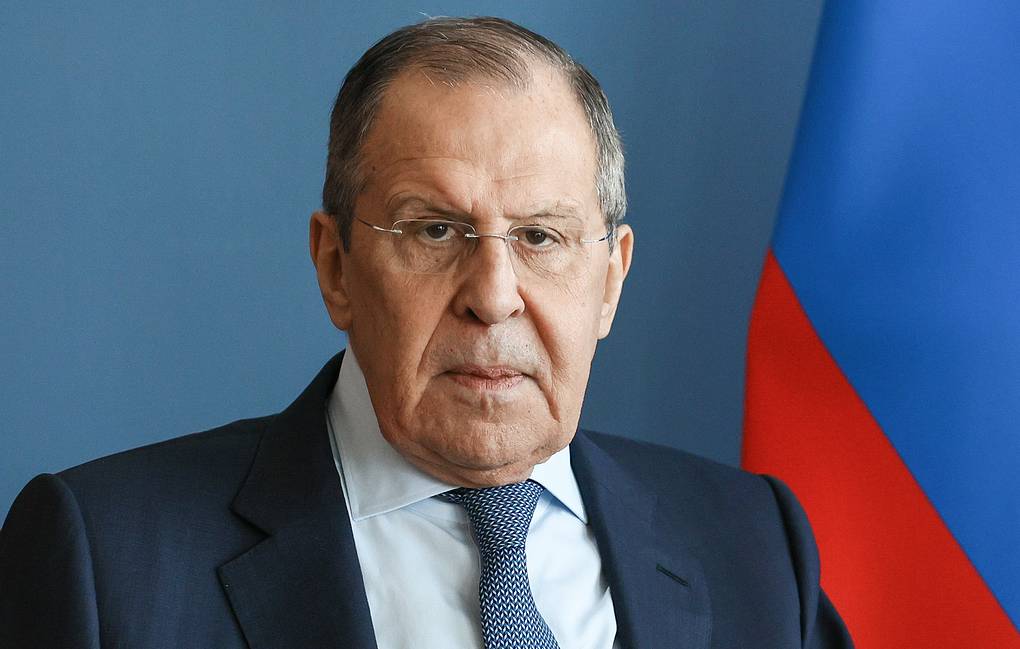 Russia’s Minister of Foreign Affairs Sergey Lavrov. (Image Credit: Russian Foreign Ministry/TASS)
Russia’s Minister of Foreign Affairs Sergey Lavrov. (Image Credit: Russian Foreign Ministry/TASS)
Before assuming the charge as Foreign Minister, Lavrov served as Russia’s Permanent Representative in the United Nations. Lavrov started his diplomatic career in Sri Lanka where he was appointed as an advisor in the Soviet embassy in 1972. He assumed the office of Foreign Ministry in 2004 with a renewed appointment in 2012.
From the Syrian civil war of 2012 to the annexation of Crimean in 2014, Lavrov has seen it all. He has worked as the frontman during the recent negotiations with the United States and NATO members. His office presented the security proposal that later became the base of Russia’s security operation in Ukraine.
7. Valentina Matviyenko
Valentina Matviyenko is the only female figure in Putin’s close circle. She is also a Putin loyalist from Saint Petersburg and serves as the Chairwoman of the Federation Council. In 2003 Valentina Matviyenko became the first female governor of St. Petersburg. Matviyenko’s services for St. Petersburg were highly supported by President Putin since he is also a native of St. Petersburg. Matviyenko resigned from the governorship in 2011 to assume the charge of heading the Upper House of the Russian Federation.
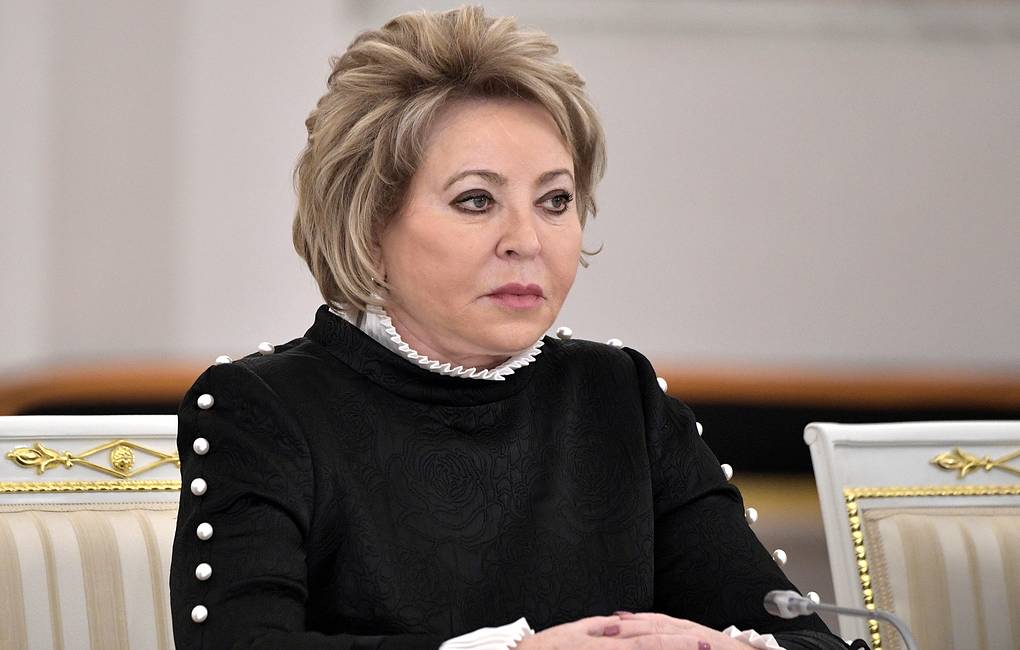 Russian Federation Council Speaker Valentina Matviyenko. (Image Credit: Alexei Nikolsky/Russian Presidential Press and Information Office/TASS)
Russian Federation Council Speaker Valentina Matviyenko. (Image Credit: Alexei Nikolsky/Russian Presidential Press and Information Office/TASS)
In September 2011 she was elected as the Chairwoman of the Federation Council of Russia. She played an important role in approving the decisions for the annexation of Crimea in 2014 and played a similar role in Russia’s military operation in Ukraine.
8. Viktor Zolotov
Viktor Zolotov is the current Director of the National Guards of Russia and a member of the Russian Security Council. Zolotov comes from a working-class family and started his career as the bodyguard for the mayor of St. Petersburg in the 1990s. During his appointment, he became friends with the deputy mayor and accompanied him for his judo and boxing practice. The deputy mayor of St. Petersburg later rose to become the President of Russia Vladimir Putin and so did rise his close partner Viktor Zolotov.
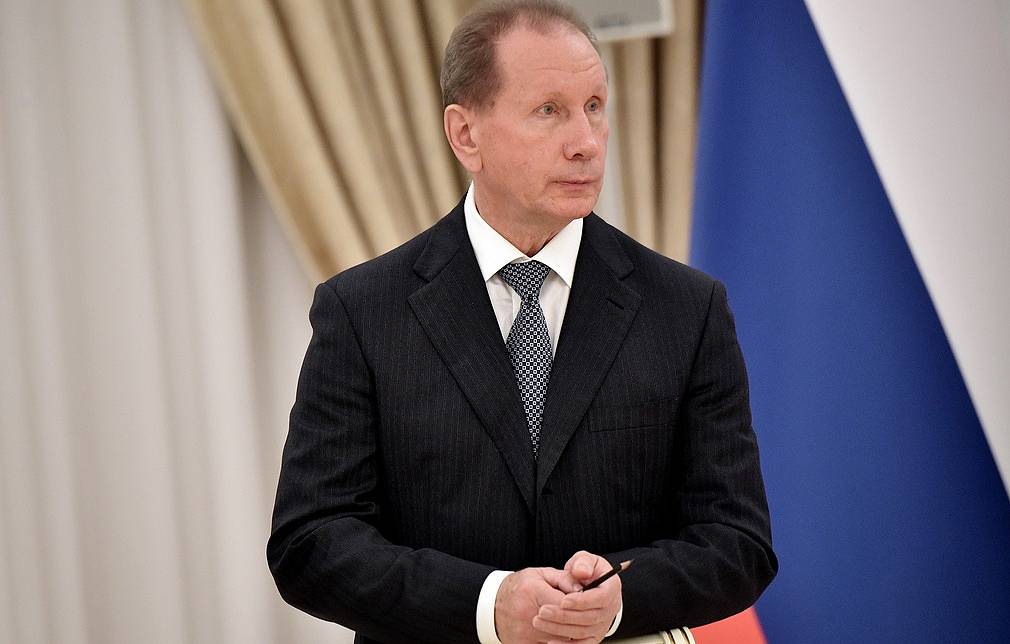 Head of Russia's National Guard Viktor Zolotov (Image Credit: Alexei Nikolskly/Russian president's press service/TASS)
Head of Russia's National Guard Viktor Zolotov (Image Credit: Alexei Nikolskly/Russian president's press service/TASS)
From 2000 to 2013 Zolotov served as Chief of Security for the Russian president and prime minister. In April 2016 Zolotov was appointed as the commander-in-chief for the National Guards of Russia or Rosgvardia, which is a special branch of the Russian military that was formed in April 2016. It consists of some 400,000 men. The force reports directly to President Putin and its purpose is to safeguard the Russian borders.
9. Sergey Ryabkov
Ryabkov is another Saint Petersburg native who is Putin’s close subordinate. He began his political career in 1995 when he worked in the Foreign Ministry's Department of European Cooperation. Later in 2002, he worked as a Counselor at the Russian Embassy in Washington, DC. He returned to Moscow in 2006 and was promoted as the head of the Russian Foreign Ministry's European Cooperation Department.
Sergey Ryabkov was assigned to the duty of Deputy Foreign Minister in 2008. Due to his fluency in English, he is the face of the Russian administration for the English-speaking world. Being a seasoned diplomat, Ryabkov is often the one who talks on behalf of the Russian administration on the issue related to Russia’s nuclear policy, international negotiations, and the ongoing war in Ukraine.
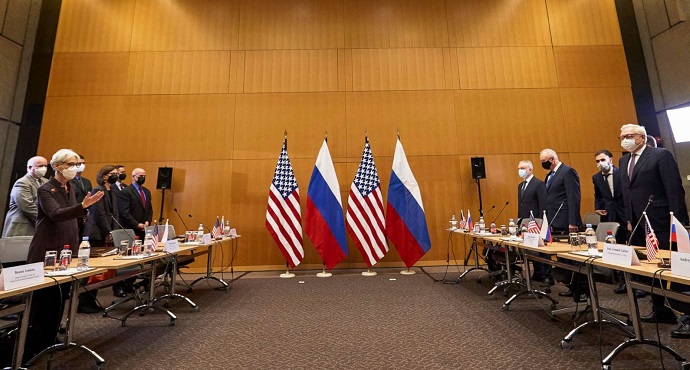 The U.S. and Russian delegations during the first round of crisis talks over Ukraine and NATO expansion. (Image Credit: Denis Balibouse/AP)
The U.S. and Russian delegations during the first round of crisis talks over Ukraine and NATO expansion. (Image Credit: Denis Balibouse/AP)
Russian Deputy Foreign Minister Ryabkov also represented the Russian side during U.S.-Russia Strategic Stability Dialogue and held meetings with U.S. Deputy Secretary of State Wendy Sherman in Geneva.
10. Vladimir Medinsky
Medinsky is a close ally of President Putin, and one of the most important political figures who is playing a major role in carrying out advances in Ukraine. He started his career at the Soviet Union’s embassy in the United States in 1992. He is a well-educated man with a doctoral degree in Political Science and History. From 2012 to 2020 Medinsky held the office of Minister of Culture. In 2020, he was appointed as the Assistant to the President of the Russian Federation.
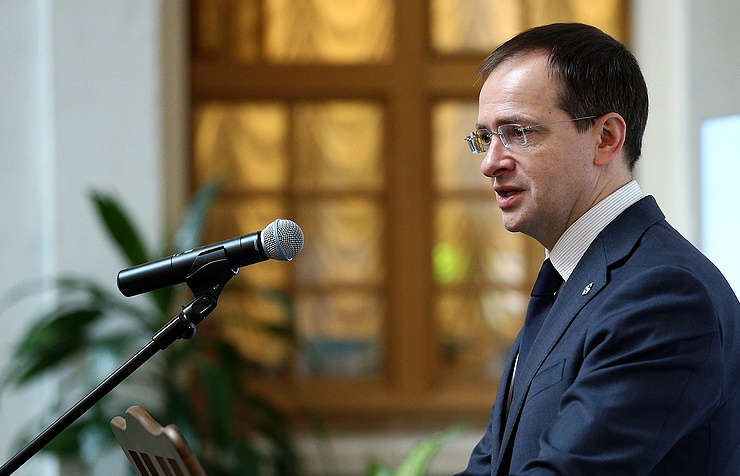 Russian President Putin's Assistant Vladimir Medinsky. (Image Credit: Mikhail Tereshchenko/TASS)
Russian President Putin's Assistant Vladimir Medinsky. (Image Credit: Mikhail Tereshchenko/TASS)
Medinsky is described as an “ultra-nationalist patriot who wants to revive the lost Soviet glory and traditional values”. It is one of the reasons why many analysts believe that he is the architect behind Russian propaganda to prove Ukraine’s inseparability with the modern-day Russian Federation. Following Russian attack on Ukraine, Vladimir Medinsky became the Head of the Russian delegation in negotiations with Ukraine in Belarus on February 2, 2022.
Apart from these prominent figures from Russian President Putin’s close associate there are some close subordinates who are working directly under the orders of the President to execute the ongoing Russian operation in Ukraine. One of the most prominent figures in this regard is the Kremlin’s Press Secretary Dmitry Peskov.
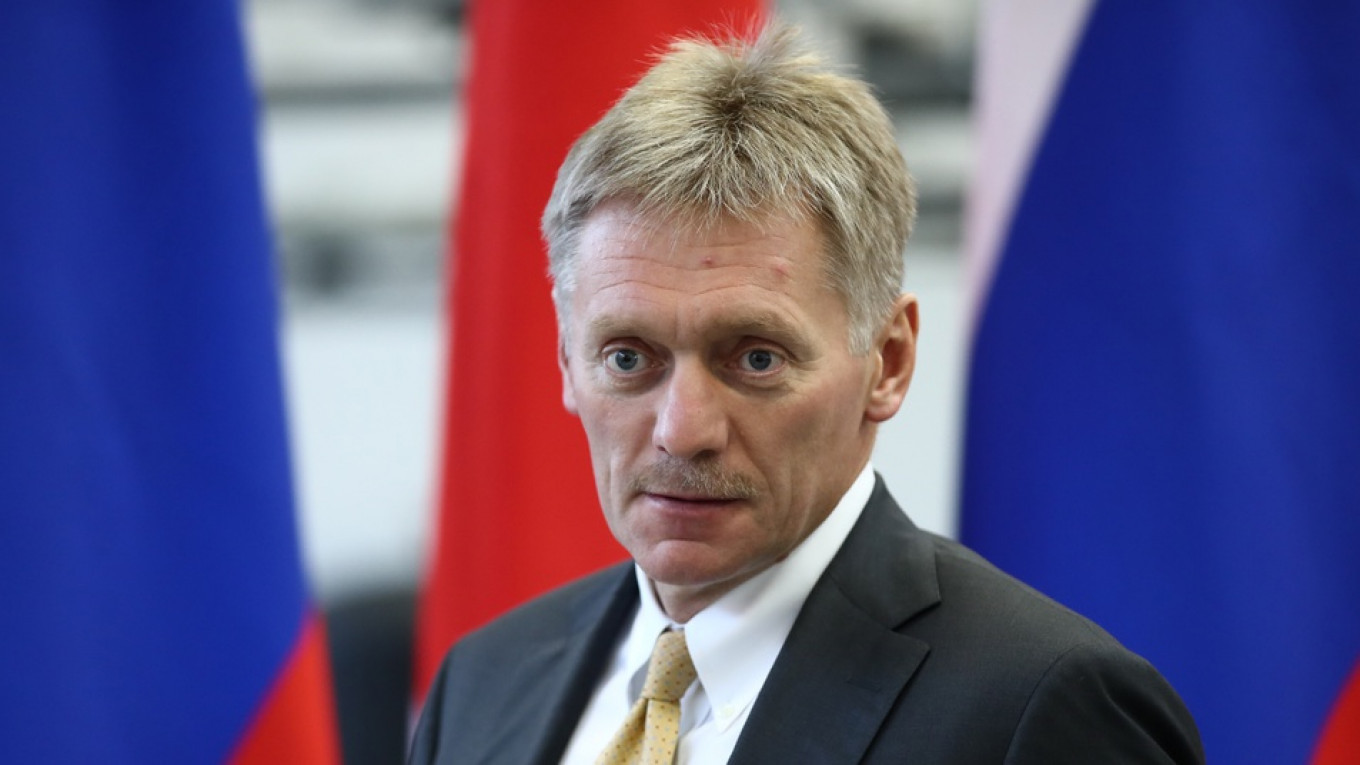 Russian presidential press secretary Dmitry Peskov. (Image Credit: Valery Sharifulin/TASS)
Russian presidential press secretary Dmitry Peskov. (Image Credit: Valery Sharifulin/TASS)
Peskov has been working as the face of the Kremlin for a long time since he assumed the office in 2012. Peskov’s diplomatic career started in Ankara when he was appointed as the administrative assistant at the Soviet Embassy in 1991. At present, he is working as the Deputy Chief of Staff of the Presidential Administration and Presidential Press Secretary of the Russian Federation.
In 2014 President Putin established National Defense Management Center, during the time Russian annexation of Crimea was still a hot topic. He appointed Mikhail Mizintsev as the Chief of National Defense Management Center who started his duty as Colonel General and was later promoted to Lieutenant General in 2017. Lieutenant General Mikhail Mizintsev is also Putin’s closest military official who actively executed his strategies in Crimea, Syria and now in Ukraine.
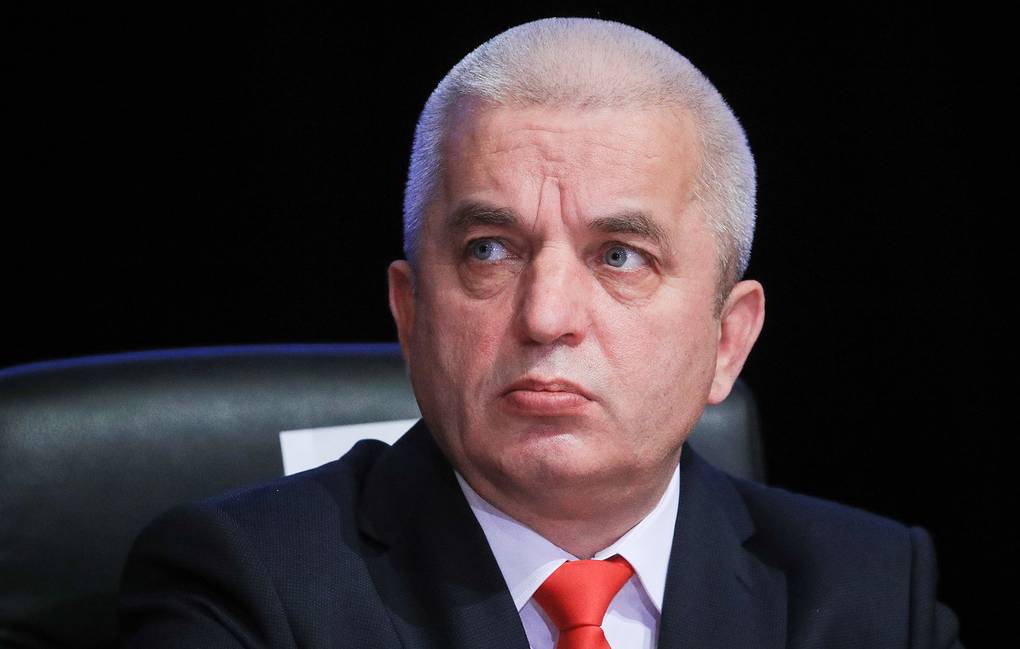 Russian National Defense Command Center's Chief Mikhail Mizintsev. (Image Credit: Sergei Bobylev/TASS)
Russian National Defense Command Center's Chief Mikhail Mizintsev. (Image Credit: Sergei Bobylev/TASS)
ALSO READ:
Regions
Issues


















 Military assistance to Ukraine from West
Military assistance to Ukraine from West What sanctions have been imposed on Russia?
What sanctions have been imposed on Russia?







